NEWS
Bhutan Nuns Foundation Poised to Launch New Training Center for Female Monastics with First Resident Nuns
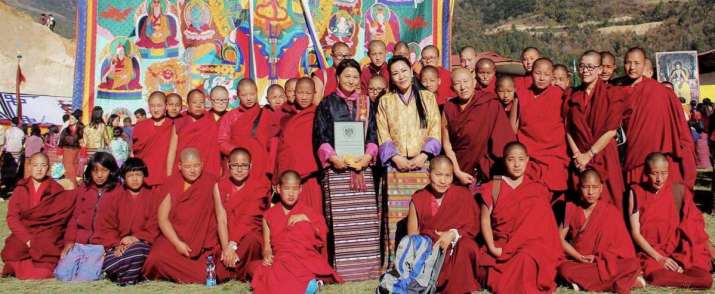 BNF executive director Dr. Tashi Zangmo, center left, and Her Majesty the Queen Mother Ashi Tshering Yangdon Wangchuck, center right, with Bhutanese nuns. From bhutannuns.org
BNF executive director Dr. Tashi Zangmo, center left, and Her Majesty the Queen Mother Ashi Tshering Yangdon Wangchuck, center right, with Bhutanese nuns. From bhutannuns.orgThe Bhutan Nuns Foundation (BNF) has announced that its long-awaited Training & Resource Center project for Buddhist nuns being constructed in the Bhutanese capital Thimphu will soon receive its first intake of female monastics, with four nuns due to take up residence in May.
“The first four nuns will finish their preliminary practice before taking up residence next month,” BNF executive director Dr. Tashi Zangmo told Buddhistdoor Global. “From then they will help the BNF run short retreats and organize training for other nuns.”
Once fully operational, the BNF’s training center will provide a host of programs teaching life skills and social engagement education to female monastics and lay women who are following the Buddhist path. The courses will include counseling training, hospice and basic healthcare, palliative care, leadership and management, and teaching methodology for Buddhist nuns who will go on to teach. In addition, the center will also provide short retreats for lay women conducted by the resident nuns, along with regular short meditation courses, Nungey instruction (a fasting practice widely practiced in Bhutan as a means of physical and spiritual purification), as well as classes in qi gong, tai chi, and yoga for the nuns.
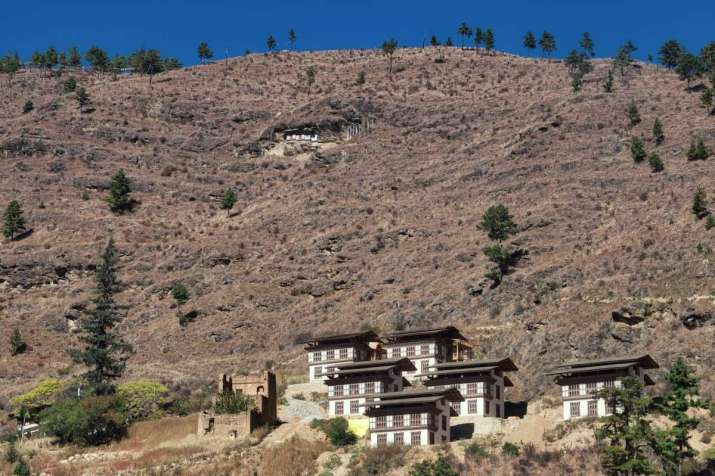 The BNF’s Training & Resource Center under construction in Thimphu, Bhutan. Photo by Craig Lewis
The BNF’s Training & Resource Center under construction in Thimphu, Bhutan. Photo by Craig LewisAlthough the training center is not yet finished and much more construction work still needs to be done to complete the project, Dr. Tashi added that the BNF was hopeful it would be able complete all work on the complex by 2020.
Bhutan, nestled in the foothills of the Himalayan mountain range, and sandwiched between two political and economic heavy hitters India and China, is the world’s last remaining Vajrayana Buddhist nation. The spiritual tradition is embedded in the very consciousness and culture of this remote land, where it has flourished with an unbroken history that dates back to its introduction from Tibet by the Indian Buddhist master Padmasambhava, also known as Guru Rinpoche, in the 8th century.
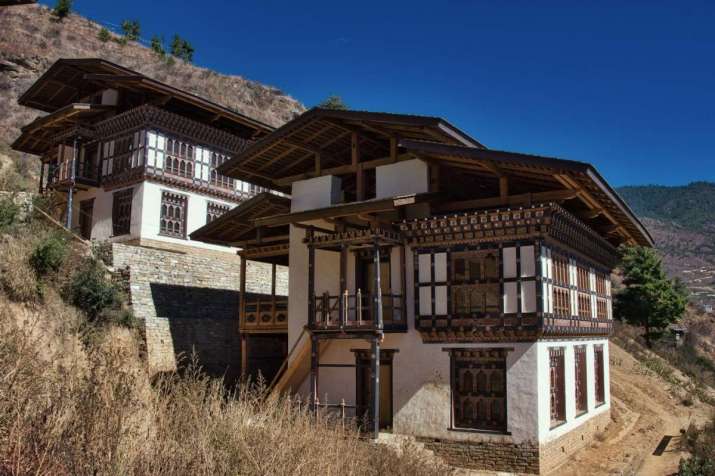 The BNF hopes the project will be completed by 2020. Photo by Craig Lewis
The BNF hopes the project will be completed by 2020. Photo by Craig LewisMany girls and women in Bhutan enter nunneries for varying periods of time to gain an education and to escape lives of poverty and worldly circumstances. These women often dedicate their lives to serving society and become very involved in local communities, assisting needy families and serving as role models. Despite the great contribution Buddhist nuns make to Bhutanese society, the country’s 28 nunneries often lack basic sanitation and proper sleeping and cooking quarters, as well as dealing with a dearth of trained teachers and learning materials.
“If the circumstances of Bhutanese nuns can be improved and they can be provided with necessary conveniences, these women and girls living and learning in the nunneries have immense potential to give back to society,” Dr. Tashi observed.
“In general, women are by nature nurturing, and if the nuns can be trained and equipped with the proper skills by creating a conducive learning space such as this training center, it will really make a huge difference to their lives and for the whole of Bhutanese society,” she explained. “Many of our nuns are yearning to be able to learn and benefit others. They often call us to ask us when we will complete construction of the center so that they can come for training and provide hands-on support for those in need—for example nuns trained as palliative caregivers can have a much more profund impact than a secular caregiver since they also have the spiritual knowledge and background.”
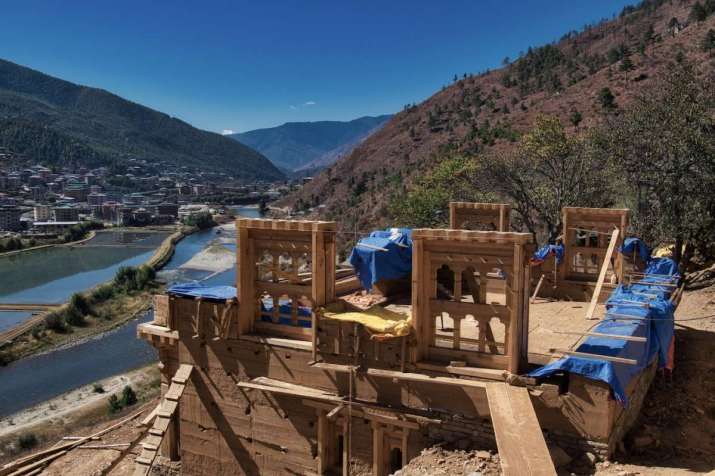 The BNF Training & Resource Center relies on traditional Bhutanese construction techniques and materials. Photo by Craig Lewis
The BNF Training & Resource Center relies on traditional Bhutanese construction techniques and materials. Photo by Craig LewisThe BNF, which operates under the patronage of Her Majesty the Queen Mother Ashi Tshering Yangdon Wangchuck, is a non-profit organization working to enhanced access to basic and higher education, and to improve the day-to-day livelihoods of Buddhist nuns in the Kingdom of Bhutan. The BNF aims to empower and educate Bhutanese girls and women, improving the living conditions and economic vitality of rural villages, and in turn helping to preserve the country’s rich Buddhist culture in the face of rapid economic development.
About 75 per cent of Bhutan’s population identify as Buddhists, according to data for 2010 from the Washington, DC-based Pew Research Center, with Hinduism accounting for the majority of the remainder. Most of Bhutan’s Buddhists follow either the Drukpa Kagyu or the Nyingma school of Vajrayana Buddhism.
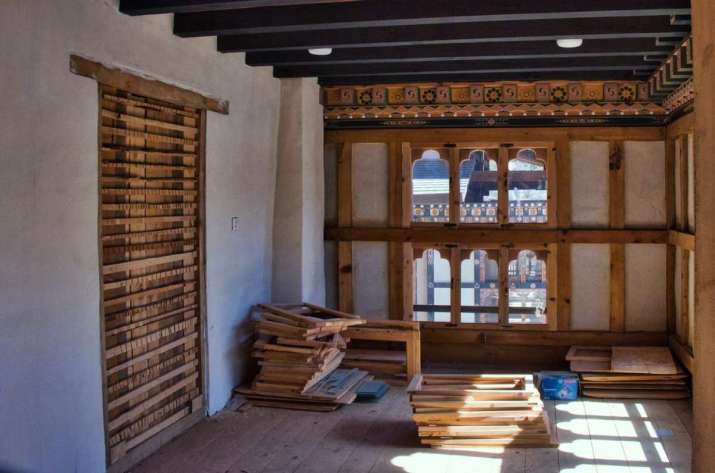 The center will offer simple communal accommodation for resident nuns. Photo by Craig Lewis
The center will offer simple communal accommodation for resident nuns. Photo by Craig LewisSee more
The Bhutan Nuns Foundation
The Bhutan Nuns Foundation (Facebook)
Related news from Buddhistdoor Global
Prime Minister of Bhutan Proposes Founding of International Center of Vajrayana Buddhism
Buddhist Kingdom of Bhutan Convenes International Vajrayana Conference
Street Artist “Invader” Draws Criticism after Defacing Buddhist Monuments in Bhutan
Bhutan, WWF Launch US$43m Conservation Program for Protected Ecosystems
Bhutan Proposes a Buddhist Approach to Business at 7th International Conference on Gross National Happiness
Related features from Buddhistdoor Global
The Growth of Wisdom and Compassion: An Interview with Drukmo Gyal Dakini, Part One
Historic Vinaya Teaching at Sravasti Abbey – A First for Buddhist Nuns in the United States
Happiness Before Profit: Bhutan Seeks to Redefine Business Using Buddhist Values
Loving your Tick: Book Review of Mindfulness as Medicine
Why Education Matters: Improving Female Empowerment and Health Practices in Nepal
An Agent of Change: Empowering Bhutanese Nuns
Buddhistdoor Global Special Issue 2018














